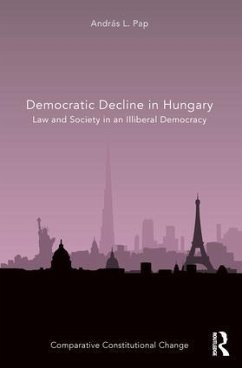- Gebundenes Buch
- Merkliste
- Auf die Merkliste
- Bewerten Bewerten
- Teilen
- Produkt teilen
- Produkterinnerung
- Produkterinnerung
This book shows the rise and morphology of a self-identified 'illiberal democracy', the first 21st century illiberal political regime arising in the European Union. The Hungarian case provides unique observation points for students of transitology, especially those who are interested in states which are to abandon pathways of liberal democracy.
Andere Kunden interessierten sich auch für
![Illiberal Constitutionalism in Poland and Hungary Illiberal Constitutionalism in Poland and Hungary]() Tímea DrinócziIlliberal Constitutionalism in Poland and Hungary180,99 €
Tímea DrinócziIlliberal Constitutionalism in Poland and Hungary180,99 €![A Radically Democratic Response to Global Governance A Radically Democratic Response to Global Governance]() Margaret StoutA Radically Democratic Response to Global Governance206,99 €
Margaret StoutA Radically Democratic Response to Global Governance206,99 €![Parallels Between The Constitution And Constitutional History Of England And Hungary (1850) Parallels Between The Constitution And Constitutional History Of England And Hungary (1850)]() Joshua Toulmin SmithParallels Between The Constitution And Constitutional History Of England And Hungary (1850)27,99 €
Joshua Toulmin SmithParallels Between The Constitution And Constitutional History Of England And Hungary (1850)27,99 €![Medical Sketches in Austria, Prussia, and Italy; Together With Some Remarks On the Roman Campagna, and On the Conquered Provinces in Italy and Hungary Medical Sketches in Austria, Prussia, and Italy; Together With Some Remarks On the Roman Campagna, and On the Conquered Provinces in Italy and Hungary]() James G HildigeMedical Sketches in Austria, Prussia, and Italy; Together With Some Remarks On the Roman Campagna, and On the Conquered Provinces in Italy and Hungary31,99 €
James G HildigeMedical Sketches in Austria, Prussia, and Italy; Together With Some Remarks On the Roman Campagna, and On the Conquered Provinces in Italy and Hungary31,99 €![Law Against Unfair Competition Law Against Unfair Competition]() Law Against Unfair Competition75,99 €
Law Against Unfair Competition75,99 €![The Decline and Fall of Samuel Sawbones, M.D., on the Klondike [microform] The Decline and Fall of Samuel Sawbones, M.D., on the Klondike [microform]]() The Decline and Fall of Samuel Sawbones, M.D., on the Klondike [microform]34,99 €
The Decline and Fall of Samuel Sawbones, M.D., on the Klondike [microform]34,99 €![The Decline of the Death Penalty and the Discovery of Innocence The Decline of the Death Penalty and the Discovery of Innocence]() Frank R. BaumgartnerThe Decline of the Death Penalty and the Discovery of Innocence79,99 €
Frank R. BaumgartnerThe Decline of the Death Penalty and the Discovery of Innocence79,99 €-
-
-
This book shows the rise and morphology of a self-identified 'illiberal democracy', the first 21st century illiberal political regime arising in the European Union. The Hungarian case provides unique observation points for students of transitology, especially those who are interested in states which are to abandon pathways of liberal democracy.
Hinweis: Dieser Artikel kann nur an eine deutsche Lieferadresse ausgeliefert werden.
Hinweis: Dieser Artikel kann nur an eine deutsche Lieferadresse ausgeliefert werden.
Produktdetails
- Produktdetails
- Verlag: Routledge
- Seitenzahl: 180
- Erscheinungstermin: 2. August 2017
- Englisch
- Abmessung: 240mm x 161mm x 14mm
- Gewicht: 440g
- ISBN-13: 9781138052123
- ISBN-10: 1138052124
- Artikelnr.: 48913744
- Herstellerkennzeichnung
- Libri GmbH
- Europaallee 1
- 36244 Bad Hersfeld
- gpsr@libri.de
- Verlag: Routledge
- Seitenzahl: 180
- Erscheinungstermin: 2. August 2017
- Englisch
- Abmessung: 240mm x 161mm x 14mm
- Gewicht: 440g
- ISBN-13: 9781138052123
- ISBN-10: 1138052124
- Artikelnr.: 48913744
- Herstellerkennzeichnung
- Libri GmbH
- Europaallee 1
- 36244 Bad Hersfeld
- gpsr@libri.de
András L. Pap is Research Chair and Head of Department for the Study of Constitutionalism and the Rule of Law, Hungarian Academy of Sciences Centre for Social Sciences, Institute for Legal Studies; he is SASPRO-Marie Sk¿odowska-Curie Fellow, Institute of Sociology, Slovak Academy of Sciences, Bratislava, Slovakia; Professor of Law, Law Enforcement Faculty, National University of Public Service; Recurrent Visiting (Adjunct) Professor, Nationalism Studies Program, Central European University, Budapest, Hungary.
Introduction
Part I. Chronology and explanations: what happened in Hungary in 2010-2012
Chapter 1. Democratic U-turn, the chronology of building an illiberal
democracy
1. Meanwhile in Hungary: An illiberal democracy in the making
2. The legislative juggernaut
3. Dismantling rule of law guarantees
4. Expanding the electorate and gerrymandering
5. And the new constitution...
6. Constitutional partnership or cemented clientelism?
7. Immediate responses
Chapter 2. Causes and explanations
1. Values and political culture
2. Orbán and his strategy: The rhetoric and politics of the "dark side"
3. A little help from the constitutional structure...
4. Economic hardship
Part II. The microfabric of the Hungarian illiberal democracy'
Chapter 3. Illiberalism as constitutional identity
1. Terminology and conceptualization
2. Illiberalism and the emergence of a new political community: The System
of National Cooperation
3. Illiberalism and the System of National Cooperation
4. Illiberal democracy as constitutional identity
Chapter 4. Intimate citizenship and value preferences in the new
constitution
1. The SNC as a workfare state
2. The SNC as a Christian state
3. Family in the SNC
4. Equality of intimate citizenship in the SNC
5. Reproductive rights in the SNC
5. Paternalism and essentialism in the SNC
6. Conclusions
Chapter 5. Illiberal multiculturalism: deceptive premises, misguided
policies
1. Illiberal transnationalism: The nation and the constitution in internal
and external homelands
2. Illiberal multiculturalism: The nation and the minorities
3. Conclusion
Chapter 6. Communitarians, dignity, and privacy: personhood and
transparency in the System of National Cooperation
1. Communities as primary agents of dignity
2. Liberal instruments for illiberal objectives: privacy as a tool to
obstruct public accountability and to protect the dignity of government
institutions and officials
3. Privacy as a tool for ethnic discrimination and marginalization
4. Concluding thoughts
Chapter 7. Closing Remarks
Index
Part I. Chronology and explanations: what happened in Hungary in 2010-2012
Chapter 1. Democratic U-turn, the chronology of building an illiberal
democracy
1. Meanwhile in Hungary: An illiberal democracy in the making
2. The legislative juggernaut
3. Dismantling rule of law guarantees
4. Expanding the electorate and gerrymandering
5. And the new constitution...
6. Constitutional partnership or cemented clientelism?
7. Immediate responses
Chapter 2. Causes and explanations
1. Values and political culture
2. Orbán and his strategy: The rhetoric and politics of the "dark side"
3. A little help from the constitutional structure...
4. Economic hardship
Part II. The microfabric of the Hungarian illiberal democracy'
Chapter 3. Illiberalism as constitutional identity
1. Terminology and conceptualization
2. Illiberalism and the emergence of a new political community: The System
of National Cooperation
3. Illiberalism and the System of National Cooperation
4. Illiberal democracy as constitutional identity
Chapter 4. Intimate citizenship and value preferences in the new
constitution
1. The SNC as a workfare state
2. The SNC as a Christian state
3. Family in the SNC
4. Equality of intimate citizenship in the SNC
5. Reproductive rights in the SNC
5. Paternalism and essentialism in the SNC
6. Conclusions
Chapter 5. Illiberal multiculturalism: deceptive premises, misguided
policies
1. Illiberal transnationalism: The nation and the constitution in internal
and external homelands
2. Illiberal multiculturalism: The nation and the minorities
3. Conclusion
Chapter 6. Communitarians, dignity, and privacy: personhood and
transparency in the System of National Cooperation
1. Communities as primary agents of dignity
2. Liberal instruments for illiberal objectives: privacy as a tool to
obstruct public accountability and to protect the dignity of government
institutions and officials
3. Privacy as a tool for ethnic discrimination and marginalization
4. Concluding thoughts
Chapter 7. Closing Remarks
Index
Introduction
Part I. Chronology and explanations: what happened in Hungary in 2010-2012
Chapter 1. Democratic U-turn, the chronology of building an illiberal
democracy
1. Meanwhile in Hungary: An illiberal democracy in the making
2. The legislative juggernaut
3. Dismantling rule of law guarantees
4. Expanding the electorate and gerrymandering
5. And the new constitution...
6. Constitutional partnership or cemented clientelism?
7. Immediate responses
Chapter 2. Causes and explanations
1. Values and political culture
2. Orbán and his strategy: The rhetoric and politics of the "dark side"
3. A little help from the constitutional structure...
4. Economic hardship
Part II. The microfabric of the Hungarian illiberal democracy'
Chapter 3. Illiberalism as constitutional identity
1. Terminology and conceptualization
2. Illiberalism and the emergence of a new political community: The System
of National Cooperation
3. Illiberalism and the System of National Cooperation
4. Illiberal democracy as constitutional identity
Chapter 4. Intimate citizenship and value preferences in the new
constitution
1. The SNC as a workfare state
2. The SNC as a Christian state
3. Family in the SNC
4. Equality of intimate citizenship in the SNC
5. Reproductive rights in the SNC
5. Paternalism and essentialism in the SNC
6. Conclusions
Chapter 5. Illiberal multiculturalism: deceptive premises, misguided
policies
1. Illiberal transnationalism: The nation and the constitution in internal
and external homelands
2. Illiberal multiculturalism: The nation and the minorities
3. Conclusion
Chapter 6. Communitarians, dignity, and privacy: personhood and
transparency in the System of National Cooperation
1. Communities as primary agents of dignity
2. Liberal instruments for illiberal objectives: privacy as a tool to
obstruct public accountability and to protect the dignity of government
institutions and officials
3. Privacy as a tool for ethnic discrimination and marginalization
4. Concluding thoughts
Chapter 7. Closing Remarks
Index
Part I. Chronology and explanations: what happened in Hungary in 2010-2012
Chapter 1. Democratic U-turn, the chronology of building an illiberal
democracy
1. Meanwhile in Hungary: An illiberal democracy in the making
2. The legislative juggernaut
3. Dismantling rule of law guarantees
4. Expanding the electorate and gerrymandering
5. And the new constitution...
6. Constitutional partnership or cemented clientelism?
7. Immediate responses
Chapter 2. Causes and explanations
1. Values and political culture
2. Orbán and his strategy: The rhetoric and politics of the "dark side"
3. A little help from the constitutional structure...
4. Economic hardship
Part II. The microfabric of the Hungarian illiberal democracy'
Chapter 3. Illiberalism as constitutional identity
1. Terminology and conceptualization
2. Illiberalism and the emergence of a new political community: The System
of National Cooperation
3. Illiberalism and the System of National Cooperation
4. Illiberal democracy as constitutional identity
Chapter 4. Intimate citizenship and value preferences in the new
constitution
1. The SNC as a workfare state
2. The SNC as a Christian state
3. Family in the SNC
4. Equality of intimate citizenship in the SNC
5. Reproductive rights in the SNC
5. Paternalism and essentialism in the SNC
6. Conclusions
Chapter 5. Illiberal multiculturalism: deceptive premises, misguided
policies
1. Illiberal transnationalism: The nation and the constitution in internal
and external homelands
2. Illiberal multiculturalism: The nation and the minorities
3. Conclusion
Chapter 6. Communitarians, dignity, and privacy: personhood and
transparency in the System of National Cooperation
1. Communities as primary agents of dignity
2. Liberal instruments for illiberal objectives: privacy as a tool to
obstruct public accountability and to protect the dignity of government
institutions and officials
3. Privacy as a tool for ethnic discrimination and marginalization
4. Concluding thoughts
Chapter 7. Closing Remarks
Index








![The Decline and Fall of Samuel Sawbones, M.D., on the Klondike [microform] The Decline and Fall of Samuel Sawbones, M.D., on the Klondike [microform]](https://bilder.buecher.de/produkte/66/66196/66196830m.jpg)
